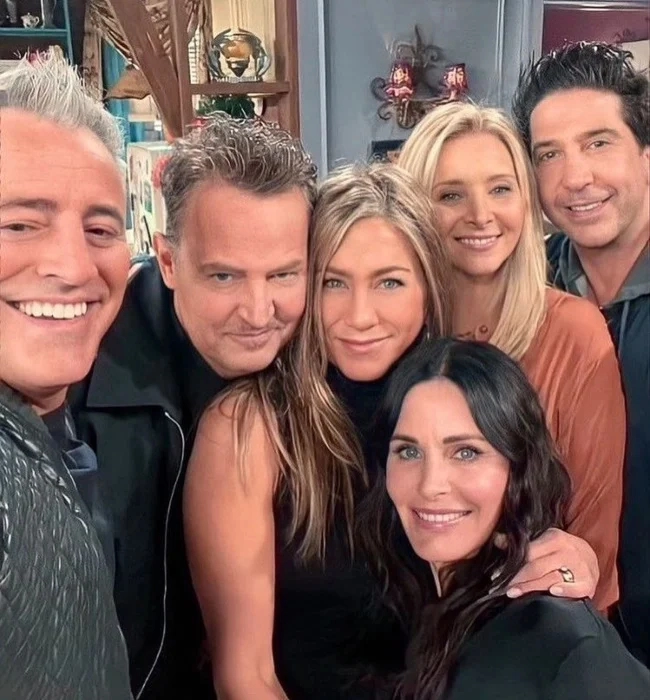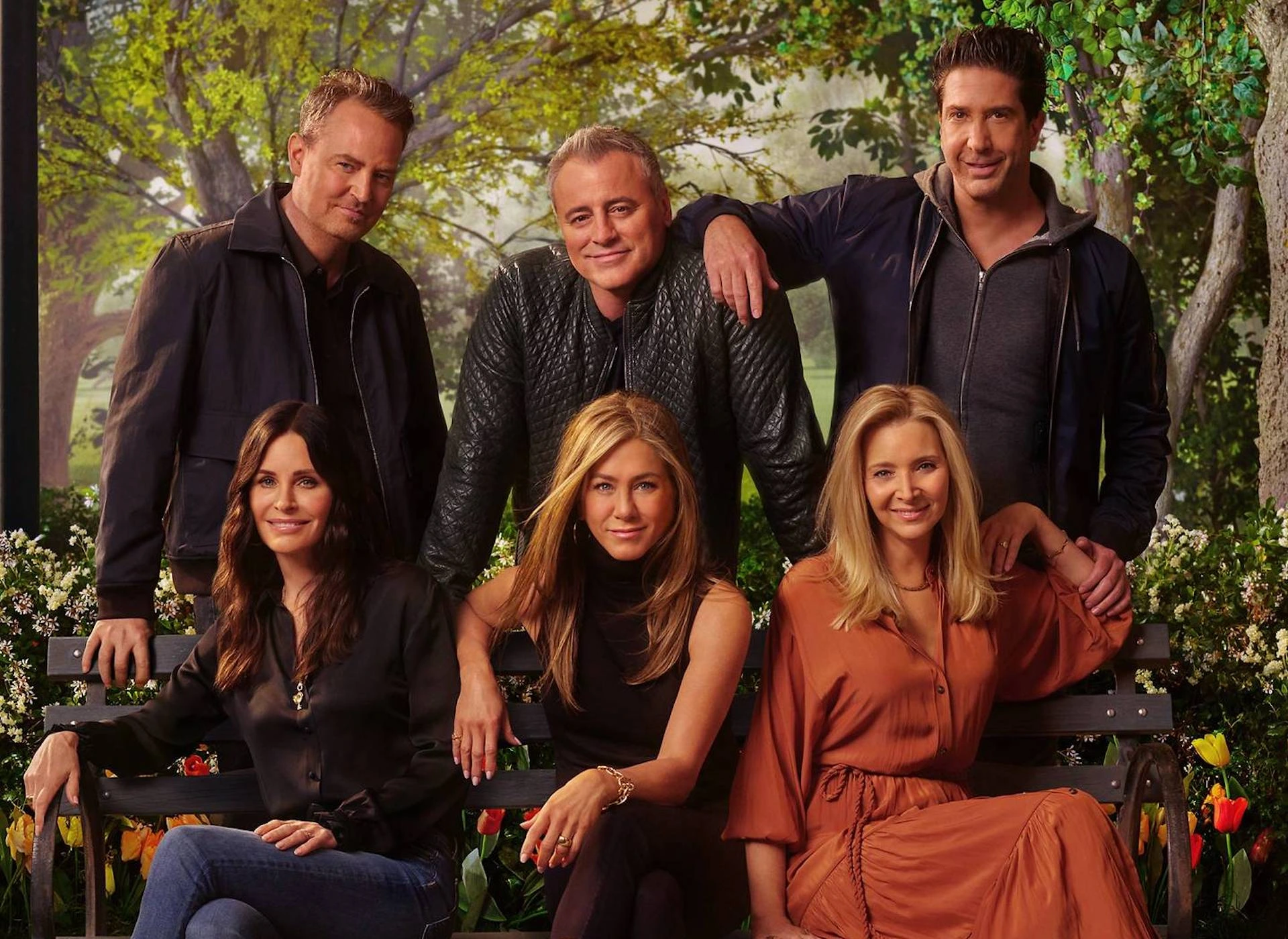Friends, the iconic sitcom that dominated television screens in the 90s and early 2000s, has captivated audiences for decades. Yet, a surprising claim from one of its leading stars, Jennifer Aniston, has sparked controversy. Aniston recently revealed that the show, once beloved by fans of all ages, is now considered “offensive” by a new generation of viewers. This statement has ignited a heated debate, leaving fans and critics questioning the evolving relevance of one of TV’s most successful sitcoms.
Aniston’s Surprising Admission About Friends

Jennifer Aniston, who famously portrayed Rachel Green for ten seasons on Friends, recently acknowledged the shifting landscape of comedy in today’s culture. In a candid interview, she noted that “comedy has evolved” and highlighted how jokes that were once considered humorous now face intense scrutiny. Aniston explained, “You have to be very careful, which makes it really hard for comedians.” She reflected on the past, noting how characters like bigots could be the butt of a joke, used to expose their absurdity. “And it was about educating people on how ridiculous they were,” she said. But today, the lines have blurred, and what was once seen as comedic relief is now viewed as problematic.
Her comments have raised questions about how Friends—a show adored by millions—holds up in today’s more socially conscious environment. As new generations revisit the series, it’s becoming clear that Friends may not resonate with younger viewers the same way it did with audiences when it first aired.
The Problematic Aspects of Friends
Over the years, certain elements of Friends have come under fire for various reasons. One of the most frequently cited issues is the show’s lack of diversity. Set in New York City, one of the most diverse cities in the world, Friends featured an almost entirely white cast, with people of color making only rare guest appearances. In a city as culturally rich as New York, the show’s depiction of a homogenous friend group seemed unrealistic and exclusionary.
Another point of contention lies in the treatment of Chandler Bing’s transgender parent, who was often the target of jokes. Today, these remarks feel outdated and offensive to many, especially given society’s evolving understanding and acceptance of transgender individuals. Similarly, other plotlines involving the LGBTQ+ community, such as Ross’s discomfort with his ex-wife’s same-sex marriage, are now viewed through a critical lens.
These problematic aspects of Friends have only become more pronounced as younger generations, who are growing up in a more inclusive and socially aware world, begin to revisit the show. What was once seen as harmless or humorous is now often viewed as insensitive or inappropriate.
A Generational Divide: Why Friends Doesn’t Resonate with Today’s Youth
Jennifer Aniston’s observation that there is “a whole generation of people, kids, who are now going back to episodes of Friends and find them offensive” touches on a significant generational divide. Today’s viewers, particularly younger ones, have grown up in a world where diversity, inclusion, and political correctness are more deeply ingrained in cultural discourse. The jokes and storylines that once elicited laughter now seem tone-deaf, outdated, or even offensive to those attuned to the complexities of identity politics.
In this age of social media, where discussions about representation and sensitivity are constantly evolving, Friends faces challenges in maintaining its universal appeal. The new generation of viewers expects their entertainment to reflect modern values, and Friends, for all its beloved qualities, may not meet those expectations.
Fans Still Cherish Friends: A Beloved Cultural Touchstone
Despite the criticism, many fans—both from the original era and new generations—continue to cherish Friends for its timeless characters, iconic catchphrases, and light-hearted humor. For these fans, the series remains a nostalgic escape, reminding them of simpler times and the relatable struggles of adulthood. They argue that while some aspects of the show may not align with today’s values, it’s essential to appreciate Friends within the context of the time it was created.
One social media user summed it up perfectly: “Both things can be true. Friends has legitimate criticisms, yet it remains a beloved and valuable cultural touchstone.” Fans acknowledge the flaws but also celebrate the show’s enduring charm, the chemistry between the actors, and the moments of genuine humor that still resonate.
The ongoing debate around Friends reflects the broader challenge of revisiting beloved media from the past. How do we reconcile our fond memories of classic shows with the realization that some of their content may be problematic by today’s standards? For many, it’s about acknowledging the imperfections while still finding joy in the aspects of the show that made it great.
The Importance of Context and Growth in Evaluating Friends

As society continues to evolve, the conversation around Friends presents an opportunity to reflect on how far we’ve come in terms of diversity and inclusion in the media. Rather than canceling or dismissing older works, it’s essential to evaluate them within their historical context. Comedy, in particular, often mirrors societal norms, and what was once considered acceptable may now feel out of touch.
Marta Kauffman, one of the creators of Friends, has publicly acknowledged the show’s shortcomings, particularly in its lack of diversity. She has even taken steps to make amends, donating $4 million to fund an endowed chair for the African and African American Studies department at Brandeis University. Kauffman’s actions demonstrate a willingness to learn from past mistakes and to support a more inclusive future.
This nuanced approach is crucial. Rather than simply criticizing older works, society should engage in thoughtful conversations about how media has evolved—and how it can continue to improve. By recognizing both the merits and the flaws of beloved shows like Friends, we can appreciate their cultural impact while also striving for greater representation and sensitivity in future storytelling.
Balancing Nostalgia and Social Progress
The debate surrounding Friends reflects the broader tension between nostalgia and the progress society has made in terms of inclusion and representation. On one hand, Friends holds a special place in the hearts of millions of fans who grew up watching it. On the other hand, many of those same fans now recognize that the show, like many others from its era, doesn’t always align with today’s values.
As we continue to revisit classic shows, the challenge lies in finding a balance—celebrating the elements that made them iconic while also acknowledging and learning from their flaws. This delicate balance will shape how we view shows like Friends in the years to come.
Conclusion: The Complex Legacy of Friends
Jennifer Aniston’s comments have sparked a necessary and timely conversation about the changing nature of comedy, the impact of media on cultural norms, and the importance of diversity in television. While Friends remains a beloved sitcom with timeless humor and memorable characters, it also reflects the cultural attitudes of its time—attitudes that don’t always resonate with today’s audiences.
As we continue to engage in discussions about representation and inclusion, it’s essential to approach older works like Friends with nuance. By acknowledging both their flaws and their impact, we can celebrate what they brought to the table while also recognizing the need for growth in media and storytelling.


